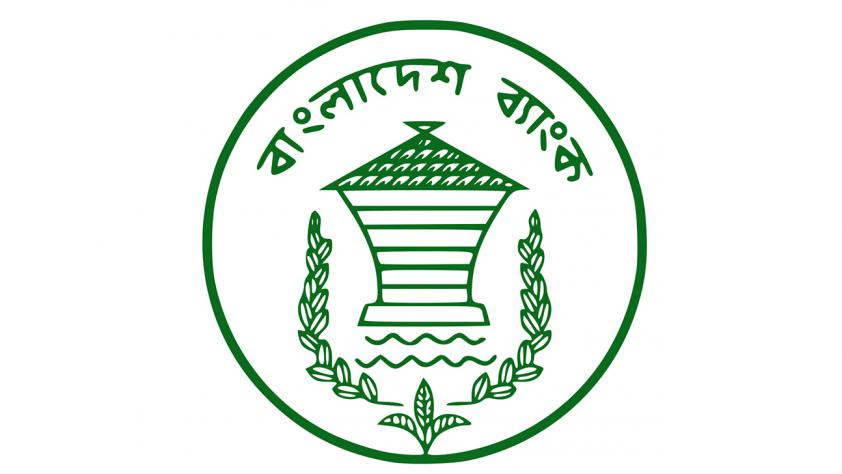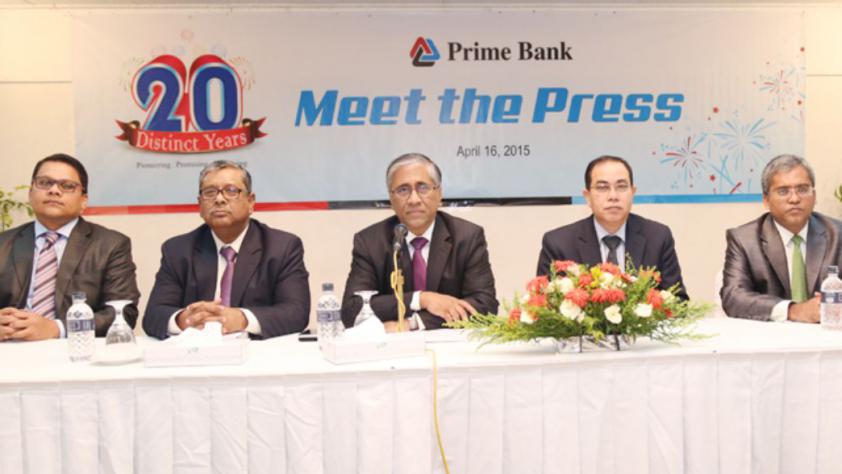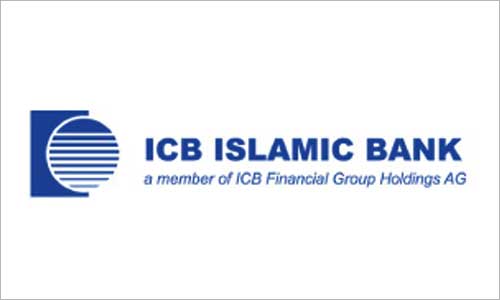BB must have more control over money market
Chief economist says govt's control over interest rates on savings certificates disturbs market

The government should give more powers to Bangladesh Bank to allow it to properly play its role in the money market and rein in inflation, the central bank's Chief Economist Biru Paksha Paul said yesterday.
The government's control on the interest rate on savings certificates disturbs the market and affects the central bank's efforts to bring down lending rates and control inflation, which are needed to boost investment, he said.
“The central bank is supposed to control the interest rates. If there is someone else playing this role, our game is disturbed.”
“We have a referee -- the government. If the referee takes sides, the game is disturbed,” Paul said.
Speaking at a discussion on the state of the economy organised by the Board of Investment at Dhaka Reporters Unity, Paul said: "If the interest rate on saving certificates is high and you are forcing the banks to reduce the deposit rate, funds will be channelled into savings certificates. And there is a moral hazard as well.”
The sales of saving certificates rose 77.42 percent to Tk 26,533.48 crore in July-February from the same period a year ago, according to BB.
The spike is due to the high interest rate of 13 percent offered by the government on the instruments, while the rate is below 10 percent for banks; there are some instruments that are tax-free too, said officials.
"I will request the government to either reduce the interest rate on savings certificates or give control over the rate to the central bank," he said.
A reduction in the interest rate on savings certificates might facilitate a cut in bank rates and stimulate investment, he added.
"If it is done, investment will pick up," said Paul, urging the government to control taxes and fiscal issues.
The average lending rate declined to 12.32 percent in January from 12.46 percent in December, according to BB.
Inflation went down to 7 percent from 12 percent in the last three years, but the average lending rate did not go down to that extent due to institutional rigidity towards a downward revision, he said.
Many companies are switching to foreign borrowing because of the high lending rates in Bangladesh, Paul added.
However, foreign direct investment or FDI remains insignificant as a percentage of the gross domestic product, he said.
"We have to increase the efficiency of our bureaucracy. Our economy is strong but the institutions are not," he said, citing foreigners' complaints about weak institutions.
BoI Executive Chairman SA Samad said FDI is less than 2 percent of GDP.
He said foreign investment is led by supply, and Bangladesh should be an attractive destination to foreign investors because of various incentives offered by the government.
"It does not depend on me. It depends on those who invest. Investors have choices, but as an economist, I asked why we are not getting it.”
“I do not think there is any flaw in whatever we have designed to attract FDI," Samad said. FDI has been increasing since 2009, he added.
It cannot be explained why the member states of the Organisation of Islamic Countries get only 2 percent of global GDP and why China gets 10 percent, said the BoI chief.
“I believe Bangladesh is an attractive investment-wise, as it has a high rate of return and investment is secure here.”
Most investors who went to Vietnam and Myanmar have already left those countries. “People do not keep record of that but, in Bangladesh, the investment that has come has stayed and most profit is reinvested.”
Prime Minister's Energy Adviser Towfiq-e-Elahi Chowdhury said Bangladesh has made strides on economic and social fronts ranging from steady economic growth to poverty reduction. The standards of living have also improved, he added.
Some 70 percent of the population now has access to electricity, which was 45 percent a couple of years ago, he said.
News:The Daily Star/27-Apr-2015Egypt joins Asian Investment Bank, hopes for funds
Egypt has been approved as a founding member of the Beijing-backed Asian Infrastructure Investment Bank, opening the way for it to benefit from the bank’s $50 billion in funds, the foreign ministry said Thursday. Britain, Germany, France and Italy are also among the 57 founders of the AIIB, despite scepticism about it in Washington and Tokyo. As a result of its acceptance, Cairo will also have access to its ‘vast funding opportunities to finance development and infrastructure projects,’ the ministry said. It will also be able to participate in formulating the institution’s regulations and policies, the ministry said. President Abdel Fattah al-Sisi, who ousted his Islamist Mohamed Morsi in 2013, has vowed to revive Egypt’s economy battered after years of political turmoil. In March, at an international investment conference in the Red Sea resort of Sharm el-Sheikh, Egypt signed investment contracts worth $36.2 billion aimed at kick-starting economic growth. China and 20 other countries signed a memorandum of understanding in October to establish the AIIB. The new multinational lender is seen as a rival to the World Bank and the Asian Development Bank, two institutions under strong US influence. Washington has voiced concern about whether it would meet international governance, environmental and social standards, with president Barack Obama’s administration waging an intense but low-profile lobbying campaign against it. China is expected to foot the bulk of the initial money needed to get the AIIB started, with donations from other members set to increase the size of the overall fund to more than $100 billion.
News:New Age/23-Age-2015
Women entrepreneurs take lead
The 71st Social Business Design Lab organised by Yunus Centre took place yesterday at the Grameen Bank Bhaban in the capital, says a press release.
The programme was chaired by Nobel Laureate Professor Muhammad Yunus, and brought together more than 130 participations from Bangladesh and abroad coming from diverse backgrounds. Professor Yunus welcomed the participants to the Lab and updated the audience that 885 social business projects had been presented in the 70 labs organised to date since January 2013, of which 860 had been approved for investment, most of which were already in operation. He said, “We would soon cross the 1000 invested projects mark”.
At the 71st Lab held yesterdaty, six new Nobin Udyokta - new entrepreneurs from Grameen Bank families - presented their
business plans. Remarkably, four of the six entrepreneurs presenting yesterday were young women.
Their presentations provided details of their business plans, details of the investment needed, monthly and annual profits, break even point for the business, and payback period of their investment. The projects were discussed in detail in plenary and in group discussions. All six were approved for investment through social business fund.
In addition, Grameen Shakti Samajik Byabosha signed six new Nobin Udyokta projects and Grameen Kalyan also signed MoU with six new Nobin Udyoktas yesterday.
At the end of the event, Professor Muhammad Yunus noted that it was very good progress that nearly 900 new social businesses projects had been launched in the two years since the start of the Social Business Design Lab in January 2013.
He said that the vast majority of them were Nobin Udyokta projects where the young people running the businesses had undertaken that they would not be job-seekers, rather they would be job-givers, providing employment for themselves but also for others in their communities, which was an invaluable contribution to the national economy.
Professor Yunus invited everyone to attend the annual Social Business Day celebration which would take place in 2015 on 28 May.
Prime Bank to celebrate 20th anniversary
 Ahmed Kamal Khan Chowdhury, managing director of Prime Bank, attends a press conference to announce celebrations marking the bank's 20th anniversary at a hotel in Dhaka yesterday.
Ahmed Kamal Khan Chowdhury, managing director of Prime Bank, attends a press conference to announce celebrations marking the bank's 20th anniversary at a hotel in Dhaka yesterday.
Prime Bank Managing Director Ahmed Kamal Khan Chowdhury yesterday announced a number of programmes to celebrate its 20th anniversary today.
The bank will organise a blood donation programme supported by the Thalassemia Hospital for all employees of the bank, he said in a press briefing in the capital.
An art competition among the children of Prime Bank's employees will also be organised, the bank said in the statement.
The bank will soon launch the renowned MasterCard brand for its clients, Chowdhury said.
“We want to provide our customers with international standard banking services.”
News:The Daily Star/17-Apr-20157 ex-officials of Oriental Bank get 10-yr jail for loan scam
 Ex-7 officials of Oriental Bank, currently known as ICB Islami Bank gets 10-yr regoous imprisonment for loan scam.
Ex-7 officials of Oriental Bank, currently known as ICB Islami Bank gets 10-yr regoous imprisonment for loan scam.
A Special Judge’s Court on Monday ordered to send seven officials of Oriental Bank to ten years rigorous imprisonment each for sanctioning a loan of Tk 1.00 crore to a spurious company. The amount was later accumulated to Tk 1.88 crore with interests. The Special Court’s judge Hosne Ara Begum, passed the order and asked them to pay a fine Tk 1.90 crore. They all worked at the headquarters of the bank on Kazi Nazrul Islam Avenue when the crime was committed in 2005. The offenders were identified as Khan Md Harun, senior vice president of the bank, Abul Kashem Mahmudullah, senior assistant vice president, Fazlur Rahman, former assistant vice president, Mahmud Hossain, senior executive vice president, Kamrul Islam, former executive vice president, Enamul Haque, former deputy general manager. Earlier, M/s Tanveer Agency, opened an account with Oriental Bank’s (recently known as ICB Islami Bank) headquarter at Kazi Nazrul Islam Avenue on July 27 in 2005 and applied for Tk 10,00,00,00 loan, which was granted on that very day. Later the investigations revealed that the company was a fake one. Deputy Director of Anti Corruption Commission, Md. Jahangir Alam filed a case against the officials in this connection on December 29 in 2006. Police pressed charges against the officials on March 9, 2013.The convicts have been hiding.
News:New Age/13-Apr-2015


